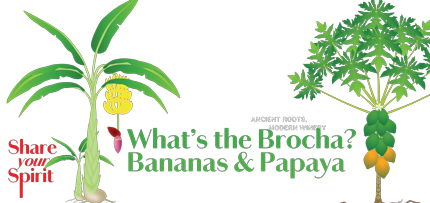The proper brocha on a banana is “borei pri ha’adamah”, but bananas seem to grow on a tree, so how is that possible?
Actually, banana plants are large, perennial plants which are primarily cultivated for fruit. A banana plant isn’t a tree at all! Its stem is called a pseudo-stem; it is formed by tightly-packed, overlapping leaves that unravel themselves as the plant grows taller and 90% of the plant consists of water. The pseudo-stem stops growing once all the leaves have unraveled and the stem of the inflorescence — flowers which will turn into fruits — reaches the top. From the fruit stem, the bananas grow out in clusters. The shape in which they grow is similar to a hand which is why they are called “banana fingers”.
At harvest time the banana plantation workers usually cut the stem down with all the banana “fingers” still attached.
In Seder Birkas HaNehenin1, the Baal HaTanya writes that there are three opinions on the parameters for defining a tree for the sake of the brocha.
1. If BOTH the stem and roots remain year to year, it is considered a tree.
2. If the roots remain from year to year, it is considered a tree.
3. In order to be considered a perennial, the entire tree has to remain, including its branches.
The Baal HaTanya concludes that in case of a doubt, one should to say the brocha of “borei pri ha’adamah”, and he adds that this should be done even l’chatchila.
Now that we know the proper brocha for the banana, let us address another fruit that looks like it grows on a tree, yet the brocha is “borei pri ha’adamah” – the papaya, also called papaw or pawpaw.
Just like the banana, the papaya plant isn’t a tree at all. It isn’t woody and is perennial. The fruits of the papaya are flowers, just like bananas. Therefore, the tree is really an herb. The fruit of the papaya grows out of the stem itself on hook-like individual stems without any branches, unlike the banana by which the true stem could be viewed as a branch coming out of the tree.
According to the Baal HaTanya2 the brocha is “borei pri ha’adamah”, but for a different reason. The discussion which was brought above discussed the nature of the tree, while assuming that the banana grows on a branch-like extension. When the fruit grows out of the tree itself, like the papaya, the brocha is “borei pri ha’adamah” according to all opinions.
If one recited the brocha of “borei pri ha’eitz” on a banana by mistake, one would not need to make another brocha, because there is an opinion that classifies the banana plant as a tree. If one makes the brocha of “borei pri ha’eitz” on a papaya, one is required to make the correct brocha of “borei pri ha’adamah”.
פ”ו הל’ ו’-ז’ 1
שם 2


 EN
EN  ZH
ZH  KR
KR  BR
BR  ES
ES  IN
IN  IL
IL 




